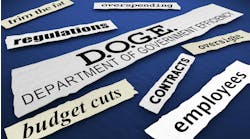It seems that everyone is talking plastics these days. The push toward a circular economy has created new growth opportunities for industries involved in the plastics recycling process, while generating controversy about the movement's true intended goals and outcomes. For the chemical industry, it’s a chance to expand its market position while combating plastics pollution. For environmental groups, the focus on plastics is about reducing or limiting production.
Over the past several years, chemical producers are building and expanding facilities to convert used plastics into feedstocks for new plastics, chemicals and other raw materials for manufacturing.
Last week, Exxon Mobil Corp. announced that it had begun production at a large-scale plastics recycling facility capable of processing 80 million pounds of plastics waste per year. The plant is part of a larger-scale plan to grow Exxon’s plastics recycling business globally. By 2026, the company plans to boost its annual plastics recycling capacity to 1 billion pounds, with several sites across North America as well as Belgium, the Netherlands, Singapore and Canada under consideration for new plants.
In November, Sabic Global Technologies, a subsidiary of Saudi chemical firm Sabic, entered into a joint agreement with plastics recycling company Synova and French engineering firm Technip Energies to build a commercial-scale plant that will produce olefins and aromatics from plastics, with production expected to begin in the 2027-2028 timeframe.
Companies also are developing new products to enable plastics circularity, with BASF introducing its PuriCycle line, which is designed to remove or convert a wide range of impurities in pyrolysis oils and enable downstream processing of circular plastics streams.
Regulatory Resistance
Still, the chemical industry faces challenges when it comes to plastics recycling both from a regulatory and public perception standpoint. The American Chemistry Council decried the Protecting Communities From Plastics Act introduced on Dec. 1 by U.S. Sen. Jeff Merkley, D-Ore., and Rep. Alan Lowenthal, D-Calif., as “a raw deal for America that would stall the acceleration of a circular economy for plastics currently underway.”
The bill aims to move the U.S. economy away from single-use plastics and protect low-income communities, particularly those with a high percentage of Black residents or people of color, who are disproportionately affected by pollution resulting from plastics production. The bill’s sponsors say the measure would “directly tackle the plastic pollution crisis by cracking down on the plastic production process.”
In response, Joshua Baca, ACC’s vice president of plastics, said the bill would result in job losses, potentially kill billions of dollars in technology investments, and worsen the climate crises by encouraging the use of materials with a higher carbon footprint.
Global efforts are also underway to reduce or eliminate plastics waste, with the Intergovernmental Negotiating Committee completing its first round of negotiations on a global agreement to end plastics pollution in early December.
Shortly after the negotiation round, ACC voiced support for a global plastics treaty that would boost recycling efforts but does not place limits on production.
ACC supports the plastics industry’s proposal to cut waste, called “five actions for sustainable change,” which involves requirements for specific plastics amounts in packaging, the use of technology and innovation to rapidly scale reuse, the creation of a national recycling standard, the implementation of material lifecycle assessments to inform policy, and the implementation of a producer responsibility system that shifts end-of-life management to plastics producers.
“These five actions are a blueprint for the U.S. and other countries to adopt and tailor for their unique country-specific situations,” said Baca in a news release. “We continue to encourage U.S. lawmakers to pass legislation aligned with these five actions. This would serve the dual purpose of creating a more circular economy for plastics domestically, while sending a powerful signal to the globe that the U.S. is leaning forward with an ambitious model to address the challenge.”
But ACC “strongly cautioned” against calls to implement production caps on plastics. U.N. Secretary-General Antonio Guterres, referred to plastics as "fossil fuels in another form," and urged nations to crack down on pollution and production, according to Reuters news service.
Meanwhile, environmental groups have voiced skepticism over the chemical industry’s recycling initiatives, saying their efforts amount to “greenwashing.” For instance, the National Resources Defense Council (NRDC) claims that burning plastics to create fuel generates more air pollution and greenhouse gasses.
“Not only are ‘chemical recycling’ facilities failing at safely and effectively recycling plastic waste; they’re releasing harmful pollutants into vulnerable communities and the environment, said Veena Singla, senior scientist and author of an NRDC issue brief, entitled “Recycling Lies: ‘Chemical Recycling’ of Plastic Is Just Greenwashing Incineration.” “And the toxic trail doesn’t end there -- further pollution and health harm comes from burning the dirty fuels created in the process.”
In 2021, a group of 14 political and environmental scientists from various universities and non-governmental organizations institutes around the world called for an enforceable international treaty that takes a “holistic approach to plastics,” as former CP Editor-in-Chief Mark Rosenzweig noted. This includes:
• A reduction in virgin plastics production and consumption
• Facilitating safe circularity of plastics, with incentives for designs for recycling, improved recycling rates, and the use of recycled content
• Elimination of plastic pollution in the environment by safely removing and sustainably disposing of plastics accumulated on land, on waterways and in oceans
College Research Leads the Way
University research labs may hold the key to the future of plastics recycling. Over the past year, several new developments have been announced. Engineers at the Ecole Polytechnique Fédérale de Lausanne (EPFL), in Lausanne, Switzerland, have developed a proof-of-concept project to use the protein manufacturing system in living organisms as a model for converting plastics into other useful polymers. In September, University of Colorado Boulder published a study that details how a type of durable plastics commonly found in aerospace and microelectronics applications can be “chemically broken down into their most basic building blocks and then formed once again into the same material.”
“We are thinking outside the box, about different ways of breaking chemical bonds,” said Wei Zhang, lead author of the study and chair of the chemistry department, in a CU Boulder Today article. “Our chemical methods can help create new technologies and new materials, as well as be utilized to help solve the existing plastic materials crisis.”
In February 2022, researchers at the University of Bath’s Centre for Sustainable and Circular Technologies (CSCT) in the U.K. announced the development of a mild and rapid chemical recycling process for polycarbonates, a type of plastics often used in construction and engineering.
They applied a zinc-based catalyst and methanol to completely break down commercial poly(bisphenol A carbonate) (BPA-PC) beads within 20 minutes at room temperature.
“It’s really exciting to see the versatility of our catalysts in producing a wide range of value-added products from plastic waste,” stated Matthew Jones, a professor and lead researcher at the University of Bath’s CSCT, in a news release. “It’s crucial we target such products, where possible, to help promote and accelerate the implementation of emerging sustainable technologies through economic incentives.”
ACC notes several developments that indicate continued investment in plastics recycling for years to come, citing a McKinsey study that states wider access to feedstock preparation facilities will play a critical role in the advancement of plastics recycling.
“When it comes to building a circular economy, America’s plastic makers aren’t just dipping their toes in, we’re diving in headfirst,” said Baca in a prepared statement on Nov. 15. “We’re seeing millions, sometimes hundreds of millions of dollars, being regularly announced to expand, advance and accelerate America’s plastics recycling infrastructure.”



